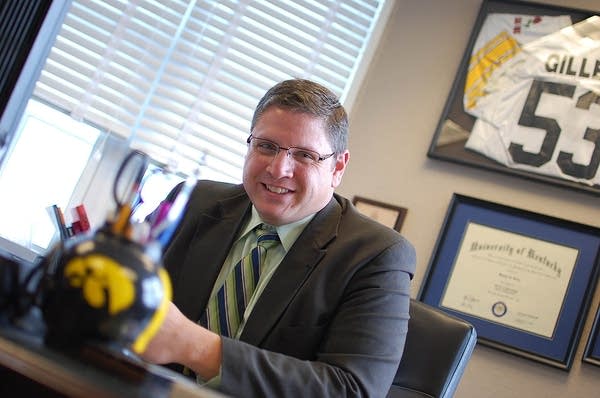For Grand Rapids, cash crunch spurs innovative ways to save

Near the shore of the Mississippi River, a small brick facility called a screen house is an example of this city's efforts to save money, and cope with dwindling amounts of Minnesota's local government aid.
Located 300 feet downstream from the city's largest employer, the UPM-Blandin paper mill, the screen house is the first step in the process to treat about 9 million gallons of pulp waste that leaves the plant each day. The water is hot — close to 130 degrees.
Grand Rapids officials are creating a new way to use the hot water to heat public buildings. Pipes will divert the hot water and run it across a heat plate exchanger, which will heat and cool the nearby city library.
"What we're projecting right now is it's going to save us between $20,000 and $25,000 a year in natural gas costs," City Engineer Tom Pagel said.
Create a More Connected Minnesota
MPR News is your trusted resource for the news you need. With your support, MPR News brings accessible, courageous journalism and authentic conversation to everyone - free of paywalls and barriers. Your gift makes a difference.
The city will invest about $250,000 into the heat conversion project, projected to pay for itself in 10 years. Officials also are considering using the water to heat the YMCA building and a subsidized apartment complex.
The Legislature's decision to cut local government aid funding has compelled local officials across Minnesota to find ways to slash budgets and become more efficient.

In Grand Rapids they've trimmed more than $1 million from the budget, while also dropping the local property tax rate by 18 percent. And it's all happened without big layoffs or major cuts in services.
Grand Rapids officials increasingly encouraged such long-range thinking in the past few years. But the loss of hundreds of thousands of dollars in local government aid from the state prompted city leaders to set an ambitious goal. They aim to eliminate their dependence on LGA by investing in technology.
The city is also trying to go paperless. Administrators have switched to electronic time cards and payroll management. A new computer program automates processes that used to require a lot of paper shuffling.
The electronic system has vastly simplified city activities, among them prepping for a city council meeting, said Eric Scott, the city's information technology director.
"For each and every council meeting prior to this system it would take approximately eight to 12 hours to completely create the agenda," Scott said. "I would say today it takes maybe between eight to 12 minutes to do that same process."
The man behind much of the budget cutting is City Administrator Shawn Gillen. A former mayor of his hometown of Mommouth, Illinois, Gillen arrived in Grand Rapids four years ago, in time for the worst recession in generations.
"We had basically this economic tsunami coming at us, and what we said was, 'let's head for the hills and not just ride it out, but let's figure out a way to live like this was a permanent situation, not just waiting for things to go back to normal,' " he said.
While many cities across the country instinctively froze spending, Grand Rapids did the opposite, Gillen said. Its leaders devised a plan for the city to borrow money from itself to invest in technology that saves money in the future.

The city also offered some workers early retirement, reducing its workforce by 10 percent. Administrators increased efficiency by cross-training employees.
Gillen also came up with an aggressive plan to reduce employee health care costs. The city switched to a cheaper, high-deductible plan, and paid the employees' deductibles. Gillen said the move will save millions of dollars over the next decade.
With another huge state deficit looming on the horizon, Gillen expects there will be even fewer Local Government Aid dollars flowing to cities. He said that means cities will have to continue to reinvent themselves.
"I've given carte blanche to turn over every stone and try every idea and throw a rock at every hornets nest," Gillen said. "I've been directed to think about everything differently, because this is a sea change. Things are going to be a lot different 10 years from now."
Grand Rapids has lots of new ideas still on the table. City officials are looking for more ways to use technology and hope to save money by collaborating with other local governments.
Return to Ground Level: Forced to Choose »
